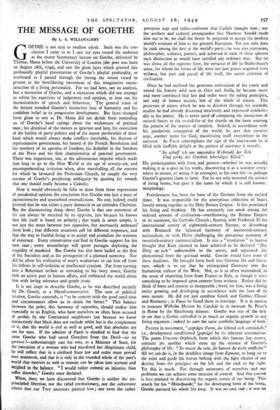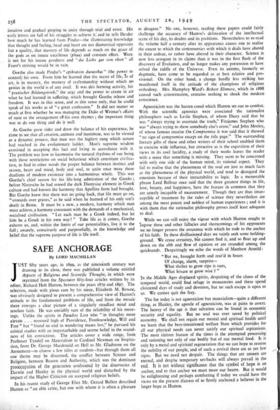THE MESSAGE OF GOETHE
By L. A. WILLOUGHBY
man ; his dismissal of the masses as ignorant and lazy, his conviction of the futility of party politics and of the innate perversities of man- kind which would always make conflicts inevitable, his distrust of representative government, his hatred of the French Revolution and his mockery of its apostles of freedom, his disbelief in the freedom of the Press and his firm championship of paternal government. There was impatience, too, at the adventurous impulse which made him long to go to the New World at the age of seventy-six, and uncomprehending irritation when, after marshalling all the reasons for which he favoured the Protestant Church, he caught the very essence of Goethe's perplexing ambiguity-by quoting his remark that one should really become a Catholic.
Now it would obviously be false to draw from these expressions of paradoxical opinion the conclusion that Goethe was just a mass of inconsistencies and unresolved contradictions. No one, indeed, could pretend that he was either a party democrat or an orthodox Christian. But the disconcerting thing about Goethe is that one statement of his can always be matched by its opposite, just because he knows that life itself is based on polarity ; that truth is never simple, is not just the mean between two opposites, but necessarily embraces them both ; that different situations call for different responses, and that the way to fruitful living is to accept and assimilate the tensions of existence. Every conservative can'find in Goethe support for his own case ; every misanthrope will quote passages deploring the stupidity of mankind. But Goethe has also been hailed as the first of the Socialists and as the protagonist of a planned economy. Nor did he allow his realisation of man's weaknesses to cut him off from his fellows in self-isolation or intellectual cyncism. Far. from turning into a Bohemian recluie or retreating to his ivory tower, Goethe took an active part in human affairs, and embraced the world about him with loving tolerance and gentle irony.
It is not inapt to describe Goethe, as he was described recently by Dr. Gooch, as a liberal-conservative. The sum of political wisdom, Goethe contends, is " to be content with the good until time and circumstances allow us to attain the better." This balance between the poles, this harmony of opposites, should endear him especially to us English, who have ourselves so often been accused of perfidy by our Continental neighbours just because we know instinctively that black does not exclude white but is the complement to it, that the world is evil as well as good, and that absolutes are not for man. If the admirer of Faust is shocked to find that the same Goethe who had saved Gretchen from the Devil—sic 1st gerettet !—unhesitatingly cast his vote, as a Minister of State, for the execution of a woman who had murdered her illegitimate child, he will reflect that in a civilised State law and order must prevail over sentiment, and that it is only in the rounded whole of the poet's world that motives as well as reasons can be taken into account and weighed in the balance. "I would rather commit an injustice than suffer disorder," Goethe once declared.
When, then, we have discovered that Goethe is neither the un- priacipled libertine, nor the rabid revolutionary, nor the subversive atheist that our Tory ancestors painted him ; nor even the rather pompous sage and father-confessor that Carlyle thought him ; nor the aesthete and cultural propagandist that Matthew Arnold made him out to be, we shall the better be prepared to accept the modern world's estimate of him as the greatest European. For not only does he rank among the first of the world's poets ; he was also statesman, philosopher, scientist, painter, and achieved in each of these spheres such distinction as would have satisfied any ordinary man. But he was above all the supreme liver, the virtuoso of life in Shaftesbury's sense, for whom the forms of life were not just graces acquired from without, but part and parcel of life itself,, the surest criterion of civilisation.
Once he had outlived the generous enthusiasm of his youth and. sowed his literary wild oats in Giitz and Stella, he became more and more convinced that law and order were the ruling principles, not only of human society, but of the whole of nature. The processes of nature which he was to discover through his scientific studies he had already discerned intuitively and expressed symbolic- ally in his poetry. He is never. tired of comparing the interaction of ' natural- forces to the to-and-fro of the shuttle on the loom weaving ' the pattern of the texture of creation. Indeed, in accordance with his pantheistic conception df the world, he secs that creative: urge, another name for God, manifesting itself everywhere in the. universe. As Faust contemplates the sign of the macrocosm he is filled with ineffable delight at the pattern of existence it reveals:
"So schaff ich am sausenden Webstuhl der Zeit Old tvirke der Gottheit lebendiges Kleid."
His preoccupation with form and pattern—whether he was actually: making it as a poet in his works, discovering it as a scientist every- where in nature, or seeing it in retrospect in his own life—is perhaps Goethe's greatest claim to fame. For he not only invented the science of living forms, but gave it the name by which it is still known : morphology.
Formlessness has been the bane of the German from the earliest times. It was responsible for the amorphous collection of States, loosely strung together as the Holy Roman Empire. It has penetrated his living and thinking. He has constantly run amok among the ordered systems of civilisation—overthrowing the Roman Empire or its successor, the Catholic Church ; flouting with Frederick II the: international comity of eighteenth-century Europe, or disturbing . with Bismarck the balanced harmony of nineteenth-century nationalism, or with Hitler challenging the precarious economy of twentieth-century commercialism. It was a " revolution " in human thought that Kant claimed to have achieved as he declared " Das Ding an sich " unknowable to the senses, and separated the phenomenal from the spiritual world. Goethe would have none of these dualisms. He brought form back into German life and litera- ture, which is to say that he reintegrated Germany into the humanistic culture of the West. Not, as is so often maintained, 'in the sense of importing form from France or Italy, as though it were something to be imposed upon content from without. Rather did he think of form and content as inseparable ; form, for him, was a living entity growing and developing in accordance with the laws of its own nature. He did not just combine Greek and Gothic, Classid and Romantic ; in Faust he fused them in marriage. It is as useless to measure Wilhelm Meister by Candide as to measure St. Peter's in Rome by the Strasbourg minster. Goethe was one of the first to see that a Gothic cathedral is as much an organic growth as any living organism ; indeed he uses the same symbolic language of both.'
Pattern in movement, "gepragte Form, die lebend sich entroickelt," i.e., development conditioned (geprtigt) by its inherent constitution! The poem Urworte Orphisch, from which this famous line comes, contains yet another which sums up the essence of Goethe's philosophy of life: "So mussy du sein, dir kannst du nicht entfliehn." All we can do is, in the deathless image from Egmont, to hang on' to the reins and guide the horses bolting with the light chariot of our' destiny from the precipice on the left and the rock to the right. Yet this is much. For through awareness of ourselves and our problems we can achieve some measure of control. And this control is best attained by discovering the organic centre of our being. This. search for his "Mittelpunkt," for the developing form of his being, Goethe pursued his whole life long. It was no easy task ; it was an,
intuitive and gradual groping to unity through trial and error. His early letters are full of his struggles to achieve it; and he tells Herder how much he has learned from Pindar—the illuminating knowledge that thought and feeling, head and heart are not diametrical opposites but a quality, that mastery of life depends as much on the grace of the gods as on innate excellence (phua) and constant effort. Were it not for his innate goodness and " die Lithe gar von oben" all Faust's striving would he in vain.
Goethe also made Pindar's "epikratein dunasthai" (the power to control) his own. From him he learned that the secret of life, is of art, is in mastery, the mastery of craftsmanship without which no genius in the world is of any avail. It was this forming activity, his " poetischer Bildungstrieb," the urge and the power to create in art what he had learned in suffering, which brought Goethe release and freedom. It was in this sense, and in this sense only, that he could speak of his works as of " a great confession." It did not matter so much at first whether he was managing the Duke of Weimar's affairs of state or the arrangement oP his own rhymes ; the important thing was to do one thing and do it well.
As Goethe grew older and drew the balance of his experience, he came to see that all creation, animate and inanimate, was to be viewed as a dynamic process, that man was the highest rung which nature had reached in the evolutionary ladder. Man's supreme wisdom consisted in accepting this fact and living in accordance with it. The problem was how to harmonise the natural rhythms of our being with those restrictions on social behaviour which constitute civilisa- tion, to find in other words the proper balance between instinct and reason, heart and mind, body and soul, to unite once more those dualisms of modern existence into a harmonious whole. This was Goethe's chief reason for his life-long admiration of the Greeks ; before Nietzsche he had sensed the dark Dionysiac clement in Greek culture and had known the harmony that Apolline form had brought. But Goethe knew that there was no going back, that life must go on, "onwards over graves," as he said when he learned of his only son's death in Rome. It must be a new, a modern, harmony which man must achieve, a harmony consonant with the demands of a mechanical, socialised civilisation. " Let each man be a Greek indeed, but let him be a Greek in his own way! " Take life as it comes, Goethe exhorts us, and, within the limits of our potentialities, live it to the full ; awarcly, consciously and purposefully, in the knowledge and belief that the supreme purpose of life is life itself.































 Previous page
Previous page